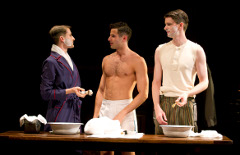
Randy Gener
"Unnatural Acts"
"Unnatural Acts"
By members of the Plastic Theatre.
Conceived and Directed by Tony Speciale.
Classic Stage Company, 136 East 13th Street
Opened June 14, 2011. Closed July 31, 2011.
www.classicstage.org | (212) 352-3101
Reviewed by Randy Gener on July 27, 2011.
On Sunday, July 31, "Unnatural Acts" will complete an incredible run at Classic Stage Company (CSC) where this show, about a 1920's-era secret investigation and witch hunt of so-called "inverts" and "homosexualists" at Harvard University, has been extended three times. Most Off-Broadway shows in New York City announce a limited run when they open. If it were not for the amazing audience demand and CSC's nimble ability to re-jigger its summer schedule, it would have been quite impossible for the rest of us to still catch this Off-Broadway show. There is still a little time. If you've heard about this excellent play but aren't completely sold on seeing it, don't even bother reading past this paragraph.
 |
| Photo by Joan Marcus. |
Seriously, now: drop everything (including your beach plans) and go.
What amazes me about "Unnatural Acts" is that it packs a powerful punch, even though the shameful events it chronicles took place more than 80 years ago and even though its source material (the Harvard Archives) had already been mined in a similar work, Stan Richardson's "Veritas" at last year's New York International Fringe Festival. According to one report, Tony Speciale, who conceived and directed "Unnatural Acts," had briefly collaborated with Richardson until the two men had a falling out. Whatever the case, where "Veritas" relied too heavily on historical accuracy (which meant getting repetitively mired in the minutiae of the interrogations), "Unnatural Acts" cuts right to the chase by beginning and ending with the suicide that precipitates the ugly and hysterical purge of gay male students, a secret trial that was conducted by Harvard University administrators of the 1920s and that was suppressed for more than 80 years. (A Harvard sophomore, Amit R. Paley, came across a reference to a "Secret Court" in the university archives, which led him in 2002 to exposing the files that had been kept from public scrutiny in the Harvard Crimson.)
Presented onstage 91 years after this ugly episode in Harvard history took place, "Unnatural Acts" imaginatively theatricalizes what emerged from the research to deliver a deeply distributing docudrama. Written by a mostly male ensemble of actors and dramaturgs (they call themselves Plastic Theatre), the play works effectively as a vivid group portrait of what gay life was like before the 1960s gay liberation movement. It is also as a meta-theatrical assemblage that compels us to chew over how far social attitudes today have changed (or, in some respects, not changed), particularly in terms of persecuting individuals on the basis of sexual orientation.
Since "Unnatural Acts" has been widely reported on and written about, it makes no sense to rehash its plot in numbing detail. Suffice it to say that, as Paley detailed in the Harvard Crimson, the investigation began after the suicide in May 1920 of a gay undergraduate named Cyril Wilcox at his family's home in Fall River. Letters from friends that arrives for Wilcox around the time of his death set off an inquiry, and later a tribunal, when his brother, a Harvard alumnus, read them.
It turns out that these letters were very incriminating indeed. Suspecting that the letter writers were homosexual, Wilcox's brother passed them on to university administrates whom he pressured to act. Although members of the outside community in Cambridge were also implicated, the clandestine tribunal, presided over by Harvard president A. Lawrence Lowell, chose as its target Perkins 28, the dorm room of a congressman's son named Ernest Roberts, who frequently hosted wild parties attended by a small group of gay men, mostly sophomores who positively reveled in the idea of sexual debaucheries. Performed in front of Walt Spangler's looming expressionistic set, dominated by a crowded bookcase enfolded (impossibly enough) by a large fireplace, "Unnatural Acts" dramatizes the fallout of the investigation, which concluded in June 1920 with the death of a second student, Eugene Cummings, Cyril Wilcox's boyhood friend.
"Dramatize" is the key verb in that previous statement. The handwritten records of the secret tribunal are notes rather than transcripts, and so this cleverly structured drama takes the form of dramatic scenes, even as it leans on documentary-style narration to lend these scenes contemporary contexts or to provide suitable transitions. Thrillingly, the CSC production extrapolates on the hard facts of the investigation itself and then pivots breathtakingly on the ensemble's collective embellishment of the relationships of the students, and their hopes and dreams, their betrayals and paranoia, and the swiftly inevitable fallout.
 |
| Photo by Joan Marcus. |
In a profound way, "Unnatural Acts" dramatizes human venality. Devastatingly, it indicts not just the Harvard administrators, who are portrayed anyway as a mass of shadowy figures in the background, but also the group of callow young men and cowards who viciously turn against one other as soon as their Perkins Hall is discovered to be a hotbed of homosexuality.
"Everyone knew what was going on in there, but no one knew what it call it," intones one character in the play. The solemnity of such narrated remarks, bolstered by the non-naturalistic moments of physical theatre, beautifully collides with the luridness implicit in our wanting to be shown what actually happened inside those raucous parties in the Harvard dorm room. To summon up the period context, Speciale is especially good at evoking the sober moves of noirish melodrama. At the same time, the director is very consciously plastic about his aesthetic intentions. The play never lets us forget the distance between how homosexuality is deemed today and how homosexuality was deemed in the past. And it's not just abhorrent behavior the play is after. As much as we might want to revel in the boy-will-be-boys hedonism, the collage-like structure of "Unnatural Acts" insists on a critical distance between the actors and the spectators. In fact, it depends on that distancing effect, without which the events it re-tells would only come across to us today as an anomalous bleep in Harvard history.
"Unnatural Acts" suffers in one important respect. Although in Act One several characters shine memorably by virtue of the gifted actors or of the function of their roles in the dramatic action, the script does not, for the most part, delve deeply enough to differentiate or to characterize the assorted men in the circle of Harvard friends. At best, the script sketches them, thus allowing the excellent actors to invest such utter and often brilliant commitment to their parts. Sometimes they might even convince us that they are tackling meatier roles, when in fact a majority of them are mere outlines of real people. For instance, Nick Westrate, as the reckless Ernest Roberts, the ringleader of the wild parties in the dorm room, is a genius at making a meal out of an unsympathetic part.
Frank De Julio and Joe Curnutte chime beautifully as a romantically entangled couple as, respectively, Keith Smerage, an aspiring actor, and Nathaniel Wollf, the adoring senior. Because they are given a lovestruck scene where Wollf mentors Smerage on how to perform a monologue from Shakespeare‘s "Anthony and Cleopatra," both De Julio and Smerage stand out. But the script never makes us feel the emotional depths of their suffering when the macho senior sells out the sensitive actor. Similarly, Roe Hartrampf has both the physical splendor and expressive gifts to transcend the limitations the scripts puts on his character, Kenneth Day, a hunky track star who finds that he enjoys the occasional blowjob. But it feels strange how he is simply dropped as soon after he completes his function in the tribunal.
In Act One, there is a memorable party scene which takes place toward the end of the term in Roberts's dorm room; this set piece is stunningly staged and exuberantly acted. Desire and the promise of sexual consummation swiftly sours, turning into fear, accusations and recriminations when each student is later called in one by one and asked by the administrators remarkably blunt questions (such as "Do you masturbate?"). This party scene is a genuine high point of "Unnatural Acts." It is also one possible moment when several of the other less colorful or more periphery characters could have emerged as individuals in their own right. Of course, part of the play's larger point is the unsavoriness of these guys' alcohol-induced and testosterone-fueled one-gunmanship.
In Act Two, Max Jenkins gets to turn the table when, as the staunch Stanley Gilkey, he emerges by cleverly portraying himself as merely researching "the homosexualist" for a career in criminology. But since Gilkey hasn't been depicted as anything other than the boisterous gay man in the group, the most that Jenkins is later able to do is draw one of the biggest laughs of the evening when, facing the tribunal, he struggles to not cross his legs.
Nevertheless, despite this quibble, "Unnatural Acts" is exquisitely
orchestrated, strongly acted, convincingly costumed (by Andrea Lauer), strikingly
lit (by Justin Townsend) and incisively staged (by Speciale). In Act Two,
there is a final impassioned speech, delivered by the narrator Eugene Cummings
(portrayed by Brad Koed) and punctuated by a ballet of choreographed movements,
that will leave you speechless. The impressive artifice of it produces a different
kind of fireworks. This ballet of manhood at Harvard demonstrates a collective
plea for courage, hope and understanding. And it is all the more dramatically
commanding when we realize that here, in this one bravura moment, these young
gay men whose lives have unraveled before us are, for once, acting together
as a courageous political unit, something they never were. For a brief shining
moment, these ghosts of men are able to perform the political agency that
was denied them. They are not just victims of homophobia, and they cannot
be ridiculed as Harvard-bred dandies or so-called perverts. Here, for perhaps
the only moment in "Unnatural Acts," they reconstruct the manly
idea, the full force of what it means to be a Harvard man.
The cast features Jess Burkle, Joe Curnutte, Frank De Julio, Roe Hartrampf,
Roderick Hill, Max Jenkins, Brad Koed, Jerry Marsini, Devin Norik, Will Rogers
and Nick Westrate. Set design is by Walt Spangler, lighting by Justin Townsend,
costumes by Andrea Lauer and original music and sound design by Christian
Frederickson.
 |
| Randy Gener |
Randy Gener is Broadway editor, a critic-at-large and a founding writer of The New York Theatre Wire. For his editorial work and critical essays as the senior editor of American Theatre magazine, he is the recipient of the George Jean Nathan Award, the highest accolade for dramatic criticism in the United States; the Deadline Club Award from the New York chapter of the Society of Professional Journalists; five travel-media awards from the annual North American Travel Journalists Association Award competition; and Journalist of the Year 2010 from the National Lesbian & Gay Journalists Association. His email is rndygener@aol.com..

| home | reviews |cue-to-cue |
discounts | welcome |
| museums | recordings |coupons |
classified |